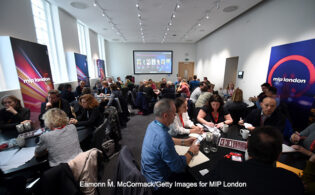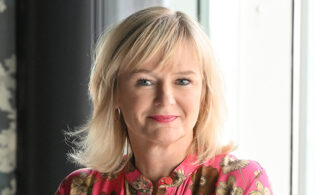Lucy Smith, the deputy director of Reed MIDEM’s TV division, talks to World Screen Newsflash about innovations, registration so far and market highlights for the reimagined MIPTV, which aims to allow participants to scale their presence at the market.
Attendees have long been asking for changes at MIPTV, the market and conference organized by Reed MIDEM. The company surveyed clients more than a year ago, and based on feedback, has reconfigured the market, its physical footprint, and is offering new ways people can participate and make business contacts.
WS: Reed MIDEM surveyed clients about a year ago to learn what their needs were for MIPTV. What did you learn?
SMITH: Two key findings: clients overwhelmingly value MIPTV, and the calendar date is an important part of the year. We consulted with more than 100 clients at the end of 2018 and the beginning of 2019. However, our clients confirmed they wanted more flexibility to be able to scale their presence according to their needs. In other words, to resize MIPTV, adjust the footprint and make it work for them.
We came up with our plan to reimagine MIPTV, and that has meant a major transformation. Today that transformation is underway, and companies can take part in the way they want to. The alternatives at MIPTV used to be: exhibit or don’t; whereas now, it’s take part, how?
Our survey also revealed that the strength of MIPTV remains that it is international and multi-genre. That continues to be our core strength, as the need for international deals becomes more critical.
WS: How are you allowing participants to scale their presence based on their needs?
SMITH: By offering them total flexibility, which means for exhibitors, they can take the size of the stand they need or, in some cases, meeting suites in the Palais. We also are offering stand design. And, of course, some companies may decide to send their execs without having a physical presence. Over 120 exhibitors have already confirmed their participation.
Each exhibition hall will have a networking area and communal spaces. This is where we want to transform the feel of the exhibition, to change the experience.
WS: In which parts of the Palais will MIPTV take place?
SMITH: When we started designing the project area last April, we decided to keep to the -1 level of the Palais and the Riviera 7 and Riviera 8. The idea was there should not be such a huge footprint for MIPTV—the same size of MIPCOM—when you are not dealing with the same size market. And again, we want to encourage attendees to use the market differently, to use these networking and communal spaces.
We are also organizing participants around their communities of genres. We have MIPDoc, MIPFormats (which both continue into MIPTV), In Development for Drama, and within In Development, there is a kids’ area. We want to encourage communities to come together within the overall MIPTV—a genre focus but in a business-efficient way.
WS: If a company’s stand is not in the space they historically had, are they being given the option of moving someplace else?
SMITH: Yes, absolutely. Most companies will have changed spaces within the Palais. We have created a truly independent exhibition hall versus MIPCOM. Now that a lot of that work is being completed, our focus is on delivering the other part of the market, which is about the audience.
And buyers are a key focus of our approach. Our buyers’ numbers are up significantly versus last year. That’s thanks in part to a new Buyers Program that was launched last summer as well as ensuring we are reaching out to larger communities to also attract new producers. We are also engaging with new companies that have not necessarily come to MIPTV before. That’s where we are focused now—let’s deliver opportunities, so people meet each other and do business together. How can people future-proof their business by meeting their future business partners?
Everything we hear is that people need to meet new partners to develop new business models. It’s no longer about just seeing the people you already know. That came through the feedback from our survey, but also all of our shows. As you know, we have the very successful models of MIP Cancun and MIP China, where we put people’s agendas together for them. What we are doing at this MIPTV is introducing a new online algorithm, which will allow us to make recommendations for people. Everybody will fill out their profile, who they are looking to meet, what their business requirements are, and this algorithm will help recommend new people to meet.
We are also creating matchmaking, speed-dating events using the information and people’s preferences we have gathered. When you have a group of people who have the same business needs in the same territories, we can put together up to 20 matching events on the exhibition floor that will also contribute to help people meet new people.
WS: What can you tell us about registration so far?
SMITH: We are delivering on what we wanted this plan to give us. Registration is on an upward trend—40 percent more than this time last year, which is a mix of buyers and producers for the most part. We are very pleased.
We have worked very closely with our buyer community to create market-intelligence sessions, with research companies to provide in-depth exclusive info to share with the buyers in a streamlined program.
We are curating screenings and showcases that will illustrate different trends. We have Fresh TV-type sessions, which we are also extending across all genres. That is what buyers have asked us to deliver, as well as distributors with fresh new content, of course.
WS: Any MIPTV highlights you can already mention?
SMITH: As you would expect, we will have several high-profile keynotes from global industry players that we will be announcing over the coming weeks as well as the Médailles d’Honneur and the International Emmy Kids Awards. We will announce the country of honor imminently, and we’re also introducing an important new award—watch this space!





